Day 4 Analysis: Welcome to ’96 America — 1896, that is
Posted: July 22, 2016 Filed under: U.S. politics | Tags: 2016 presidential race, America First, American politics, Cleveland, Cross of Gold, Donald Trump, George W. Bush, Ivanka Trump, John F. Kennedy, nativism, Republican National Convention, Ronald Reagan, William Jennings Bryan, William McKinley, Winston Churchill Leave a comment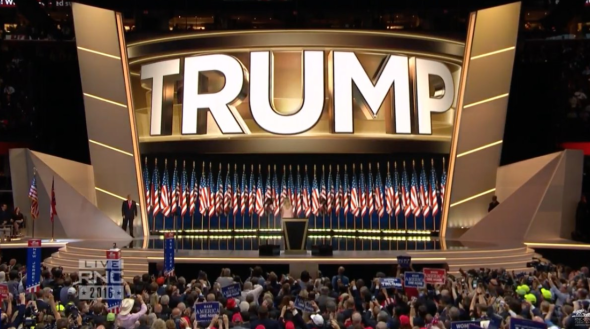
No “cross of gold” in Trump’s speech. But there was a gold stage.
At their best, presidential nominating conventions are about inspiration and optimism. Ronald Reagan’s “springtime of hope” in Dallas, 1984. Bill Clinton’s bridge to the 21st century. George W. Bush’s compassionate conservatism.
“We are not here to curse the darkness; we are here to light a candle,” Democratic nominee John F. Kennedy told delegates at the 1960 Democratic convention in Los Angeles. “As Winston Churchill said on taking office some twenty years ago: If we open a quarrel between the present and the past, we shall be in danger of losing the future.”
Donald Trump’s acceptance speech did not harken back to the optimism of Reagan or Kennedy, to the inclusiveness of Bush and Johnson. Instead, his speech was the most apocalyptic vision enunciated by a presidential nominee since ’96.
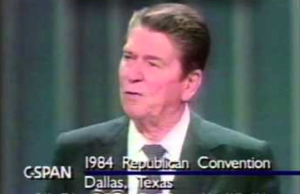
Reagan, 1984. Trump in 2016 was more like William Jennings Bryan than the Gipper.
1896, that is.
That was the year that a populist demagogue seized control of a deeply divided party and used his campaign to rail against the powerful elites in the United States and foreign capitals. It took more than a century for a presidential acceptance speech to choose a rhetorical path that dark.
Trump’s speech angrily mourned an era of American humiliation, degradation, instability and leadership incompetence. He promised, as is his campaign slogan, to “make America great again” by putting “American first.”
In many ways, the 1896 parallels make sense. The United States and the world are being destabilized by profound technological shifts. Millions of American workers have been displaced after having lost jobs that are redundant because of modern technology and increasing globalism. Those left behind — often stuck in shriveling small towns and struggling farms — angrily grasp for the lost America of the past, blaming elites and immigrants for the changes they are ill-prepared to master.
The 1896 Democratic presidential nominee, William Jennings Bryan, like Trump, was the champion of dispossessed farmers and fearful Main Street merchants. His opponent, William McKinley, was a candidate with broad support among business leaders, internationalists and educated urbanites. McKinley talked optimistically about the potential for America if it embraced the changes it faced. Bryan said McKinley would sacrifice American sovereignty before the New World Order. Trump says that he would ensure that other nations treat America with “the respect that we deserve.”
Bryan’s speech at the 1896 Democratic National Convention is best remembered for his vow to moneyed elites that “you shall not crucify mankind upon a cross of gold.” That seems a bit outdated in 2016, but many of the Boy Orator of the Platte’s words ring true in Trump’s vision of America.
In his famous speech, Bryan said that McKinley and the Republicans were “willing to surrender the right of self-government and place the legislative control of our affairs in the hands of foreign potentates and powers.”
It’s a remarkable reversal. A century and a quarter ago, the Democrats were the party of the past, the voice of an idealized order. Today, the Republicans long for a gauzy past they insist has been lost by hostile and incompetent leaders in the public and private sectors. Trump promised to represent these “forgotten” Americans left behind by Big Business and Washington power brokers.
“I am your voice,” he said.
Ivanka Trump called her father “the people’s nominee.” That’s exactly what Bryan promised to be. Donald Trump rails against Wall Street capitalism. Bryan called himself a warrior against the “the idle holders of idle capital.” Unlike his opponent, Bryan said he was truly “on the side of the struggling masses” against international competitors and urban elites. Today, Trump said, the party of Bryan has become the party of “corporate spin.”
“We cannot afford to be so politically correct,” he said, choosing a phrase that did not exist in Bryan’s day.
Instead of the “bimetalism” condemned by Bryan, you have “multilateralism” lamented by Trump. If you just substitute “factory jobs” for “farms,” Bryan’s words reflect Trump’s call for a return to the old days of imagined American industrial might:
Burn down your cities and leave our farms, and your cities will spring up again as if by magic; but destroy our farms and the grass will grow in the streets of every city in the country.
Bryan’s apocalyptical version has many parallel’s to Trump’s nihilist vision. As he worked his way up to his famous “cross of gold” climax, Bryan told the delegates:
If they dare come out in the open field and defend the gold standard as a good thing, we will fight them to the uttermost. Having behind us the producing masses of this nation… supported by… the toilers everywhere.
Trump could not have said it better himself.
>>> Read William Jennings Bryan’s Cross of Gold speech here. It also contains audio of the speech. (Modern technology in 1896.)
Eric Cantor not only joins the list of most shocking House primary losers ever, he tops the list
Posted: June 11, 2014 Filed under: U.S. politics | Tags: Bill Green, China, Congress, Dan Rostenkowski, Elizabeth Holtzman, Emanuel Celler, Eric Cantor, Fiorello LaGuardia, Greg Laughlin, James A. Byrne, Jim Wright, John F. Kennedy, Larry Neal, Michael Patrick Flanagan, New York Times, Ralph Hall, Richard Nixon, Ron Paul, Ross Perot, Tea Party, Tom Foley, U.S. Congress, Wingate Lucas 6 Comments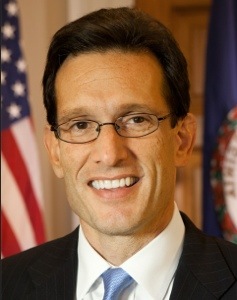 Sometimes, the hyperbole is right.
Sometimes, the hyperbole is right.
The New York Times calls House Majority Leader Eric Cantor’s lopsided primary loss to an underfunded Tea Party challenger “one of the most stunning primary election upsets in congressional history.”
It sounded like hyperbole to me, so I started to think. And think. And think. And I couldn’t think of a comparable repudiation of a House powerhouse by his own party’s voters.
Then I called out the search engines — even the ones blocked here in China — and I soon concluded that Cantor, the first House Majority Leader to be ousted by his own party since the post was created 115 years ago, topped the list.
It’s a short list, because so few primary defeats come out of nowhere. There was a bit of a buzz a couple of weeks ago when Rep. Ralph Hall of Texas, a former committee chairman and the oldest man ever to serve in the House, was ousted by a Tea Party insurgent. But few among the Pundit Elite were shocked.
This one was different. I was thinking back and I thought all the way back to the dark days of the Vietnam War, when anti-war insurgent Elizabeth Holtzman stunned longtime House Judiciary Committee Chairman Emanuel Celler in the 1972 New York Democratic primary. Celler was the longest-serving member of the House, a 50-year veteran, and his defeat rocked the House leadership almost as much as George McGovern’s landslide presidential loss did two months later.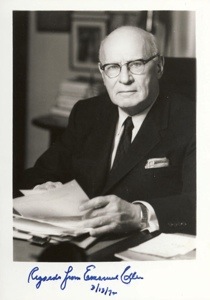
General election shockers are nothing new in wave election years or special circumstances. House Speaker Tom Foley was toppled in the 1994 Republican Revolution that ended four decades of Democratic dominance. People were shocked when Dan Rostenkowski, the Ways and Means Committee chairman, lost after getting in trouble with the law over postage stamps and a few other low crimes and misdemeanors. After all, it was Chicago, and what Daley Machine pol loses … to a Republican?
Chicago’s Michael Patrick Flanagan (the Rosty Slayer) isn’t the only challenger to see lightning strike. New York sent Republican Fiorello LaGuardia to Congress in a shocker over Tammany Hall’s own incumbent Democrat, Michael F. Farley, in 1916. LaGuardia went on to become a legendary New York mayor and the subject of a Pulitzer Prize winning musical, “Fiorello!” Farley died in 1921 of exposure to anthrax from his shaving brush.
Rostenkowski’s general election defeat was a final ripple from the the biggest anti-incumbent primary wave in modern history, when 19 lawmakers were purged by constituents angered by the House bank scandal and the lingering aftereffects of recession. The biggest name to fall in a primary that year was Michigan Rep. Guy Vander Jagt, chairman of the National Republican Congressional Commitee, who was beaten by conservative insurgent Peter Hoekstra.
The next biggest wave of incumbent House member defeats in primaries came in 1946, when 18 sitting House members were ousted so that a group of World War Two vets could come to power. None rivaled Cantor in star power.
Among the newcomers: Richard Nixon and John F. Kennedy, neither of whom ousted incumbents in primaries. Nixon shocked five-term California Democrat Jerry Voorhis in the general election, while Kennedy earned his way to DC by dispatching nine Democrats (including two named Joseph Russo — one of them recruited by his dad to split the opposition vote).
Many of the biggest primary surprises have come after reapportionment and redistricting, when party leaders try to eliminate upstarts by “pairing” them against powerful veterans. Sometimes, it backfires, like when anti-machine Philadelphia Democrat Bill Green buried ten-term incumbent (and former funeral director) James A. Byrne in 1972.
Party-switchers also have been prime targets for primary defeats, even with the support of their new party. Such was the fate of Texas Rep. Greg Laughlin, who was toppled in a 1996 GOP primary by a supposedly washed-up former congressman (and Libertarian Party presidential candidate) named Ron Paul, a man who lives to bedevil the Pundit Elite.
Occasionally — very, very occasionally — a grassroots insurgent takes out the Establishment favorite. How many of you remember when a young upstart from Weatherford, Texas, named James Claude Wright Jr. unseated four-term incumbent Wingate Lucas, the favorite of Fort Worth publisher and power broker Amon Carter, in the 1954 Democratic primary? (Former Star-Telegram political reporter and DC veteran Larry Neal does.) Wright went on to become one of the most powerful House members of the second half of the 20th century, serving as House Majority Leader and House Speaker.
Does anybody have any other nominees for biggest primary election surprises? As Ross Perot said famously, “I’m all ears.”
Movie night at Tsinghua: All the President’s Men
Posted: April 28, 2014 Filed under: Dunham's Discourses, Global Business Journalism, Journalism Training, U.S. politics | Tags: All the President's Men, American politics, Arthur Bremer, Bay of Pigs, Ben Bradlee, Bob Woodward, Bobby Kennedy, Carl Bernstein, Central High School, Chappaquiddick, China, CIA, CIA scandals, CREEP, Deep Throat, Democratic National Committee, Dustin Hoffman, Edmund Muskie, FBI, Fidel Castro, George McGovern, George Wallace, John F. Kennedy, John Mitchell, Katharine Graham, Kennedy assassination, Mark Felt, National Press Club, Pam Tobey, Pentagon Papers, Richard Nixon, Robert Redford, Teddy Kennedy, Tom Eagleton, Tsinghua University, Vietnam War, Washington Post, Watergate, White House 6 CommentsI held my first “movie night” for my Chinese journalism grad students on Sunday night. After considering a few journalism-related classics (you can probably guess which they are), I chose one that highlights the best of journalism: “All the President’s Men.” It’s not just a journalism movie, of course. It’s a great detective story and an all-around outstanding movie with crisp writing, superb acting and tension-inducing directing. “All the President’s Men” is important journalism history. It’s also important American history. But I discovered as I played the video that many of the uniquely American topics (and 1970s cultural norms) contained in the movie were difficult to understand for my Tsinghua University students. So, in addition to playing the movie with English subtitles (do you realize how quickly Dustin Hoffman speaks, with that nasal accent of his?), I occasionally paused the movie for verbal annotations. Here are some of the important points I needed to explain to the students:
Newspaper references:
- Why Ben Bradlee and many American journalists curse a lot
- How Ben Bradlee cursed on live national TV when I hosted him as a speaker at a National Press Club luncheon in 2005
- What kind of a boss Ben Bradlee was to my wife Pam Tobey
- Who Deep Throat was and what motivated him to leak
- Where the real Bob Woodward/Mark Felt garage was located
- How the movie’s producers created a replica of the Washington Post’s newsroom in Hollywood for the movie — and the Post newsroom looked exactly the same when my wife Pam began working there in 1984
- Why reporters call the targets of their stories for comment before publishing the story
- Why it was unethical when Carl Bernstein called the secretary in the Miami prosecutor’s office and pretended he was someone he was not
- Why Watergate motivated me (and the entire Woodstein generation) to become reporters
Cultural references:
- Why all of the editors in the Post’s budget meetings were men
- What a manual typewriter is (or was) and why they were all over the newsroom
- Why I took Mrs. Wolin’s typing class at Central High when everybody said that typing was for girls who wanted to become secretaries. (Of course, I wanted to learn to type so I could become a reporter.)
- Who Robert Redford and Dustin Hoffman are
- What the movie “Deep Throat” was about and why Woodward’s editor chose it as a code name for Mark Felt
- What John Mitchell was talking about when he said Katharine Graham would get a certain part of anatomy caught in a wringer
- What a “creep” means and why CREEP became the acronym for the Committee to Re-elect the President
- Why so many people smoked in public spaces
Political references:
- Who John F. Kennedy was and why his photo was in Democratic National Committee headquarters at the Watergate
- The fact that JFK and his brother Bobby were assassinated
- Why the Vietnam War was so unpopular and why American society was torn apart by war, riots and civil rights struggles
- What the Pentagon Papers are
- Richard Nixon’s unique definition of “plumbers”
- Who Daniel Ellsberg is and why he had a psychiatrist
- Who George Wallace and Arthur Bremer were and how Woodward worked with Felt on stories about the Wallace assassination attempt
- Who the anti-Castro Cubans in Miami are
- What the Bay of Pigs is/was
- The long and sordid history of CIA scandals
- Why there is tension between the FBI and the CIA
- Why Nixon hated and feared the Kennedys
- What Chappaquiddick was
- Why George McGovern asked Tom Eagleton to leave the ticket in ’72
- Why Nixon wanted to run against McGovern and not Ted Kennedy or Edmund Muskie
- Why Ed Muskie “cried” in New Hampshire
- What a “Canuck” is
Any suggestions for my next American journalism movie night?
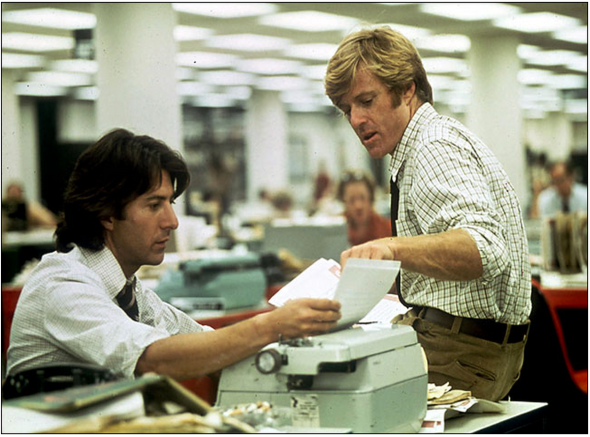
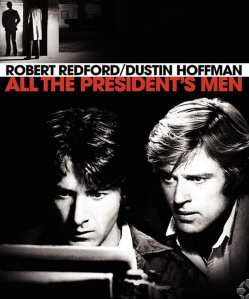
Recent Comments